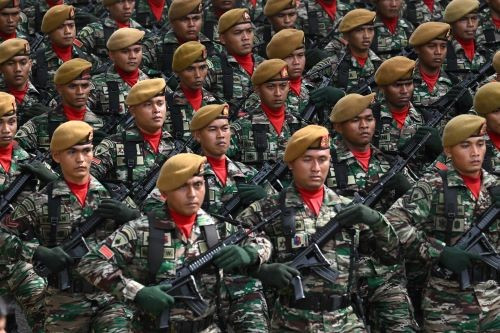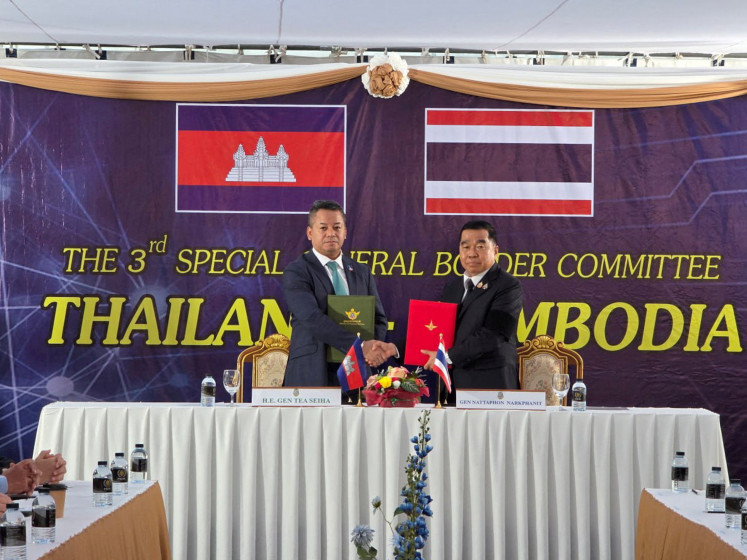Popular Reads
Top Results
Can't find what you're looking for?
View all search resultsPopular Reads
Top Results
Can't find what you're looking for?
View all search resultsFrom muscle to might
The AGO-TNI arrangement is seen as a dangerous erosion of the democratic principle of civilian supremacy.
Change text size
Gift Premium Articles
to Anyone
T
he Attorney General’s Office (AGO) may believe it needs the added protection of the Indonesian Military (TNI) to go after high-profile criminal cases. That is a legitimate concern.
But what is far more troubling, and ultimately more corrosive to the fabric of democracy, is what this arrangement signals for the future of civilian supremacy in the country.
Last month, reports surfaced of a formal arrangement under which TNI personnel would be stationed at the AGO and regional prosecutor’s offices. According to officials, this was done in the spirit of strengthening security in the face of potential threats to prosecutors’ safety as they handle sensitive graft and corruption cases.
The arrangement was further strengthened by a presidential regulation on the protection of prosecutors, not inherently a bad idea when considering the situation in Indonesia.
But such logic cannot override the principle that the armed forces must remain outside the realm of civilian law enforcement and prosecutorial work.
Why does the AGO feel it needs military protection at this time?
One possible answer is that prosecutors may be uncovering criminal cases so sensitive and politically explosive that they fear retaliation from state actors or elites.
If that is the case, it is all the more urgent that civilian law enforcement and oversight institutions be strengthened, not outsourced to the armed forces.
Criticism has been mounting from civil society groups and legal scholars, who see the AGO-TNI arrangement as a dangerous erosion of the democratic principle of civilian supremacy.
Many have pointed out that there is no clear legal basis for allowing the TNI to take part in guarding civilian law enforcement offices, warning of a precedent that could normalize a military presence in civilian institutions across the board.
This is the exact type of mission creep that activists and legal scholars had feared would become a hallmark of President Prabowo Subianto’s tenure. To allow the military to meddle in judicial functions, even peripherally, risks normalizing a culture of military omnipresence that Indonesia had worked hard to dismantle after the fall of the New Order.
There is also the elephant in the room: political continuity and power dynamics that remain unresolved in the post-Joko “Jokowi” Widodo era.
Despite no longer being president, Jokowi continues to wield influence over various sections of the state apparatus, including the police, the military and certain cabinet posts.
Is this security arrangement another manifestation of the “twin suns” dilemma, two centers of power operating within the same state? If so, then institutional independence is at even greater risk.
The line between security and interference is perilously thin. And when that line is blurred by historical baggage, personal loyalties or perceived threats, the result is a weakening of the very institutions that uphold justice and transparency.
Indonesia’s Reform era separation between the military and civilian domains was not a symbolic act. It was a hard-fought, necessary correction to decades of authoritarian entanglement.
Eroding those lines, even gradually, sets a dangerous precedent. If civilian prosecutors need better protection, then that task must fall to the police, backed by institutional reforms and public accountability, not to soldiers with rifles.
This is not about questioning the professionalism of the TNI or casting doubt on its national commitment. It is about maintaining structural clarity and legal integrity. The military must not be allowed to become an all-purpose tool for governance, justice or politics.
Less than a year into an administration that offers glaring parallels to the pre-Reform era, the foundations of democratic oversight must be reinforced, not eroded. If we begin to accept exceptional military involvement in civil institutions as routine, we will find ourselves backtracking on decades of democratic progress.
We call on the executive and judicial branches of government to rethink this arrangement. Let civilian institutions protect civilian work.
And let us ensure that no future government finds itself tempted to solve institutional weakness by military strength.
This is how democracies falter, not with a bang, but with a quiet chipping away at steadily weaker foundations.











